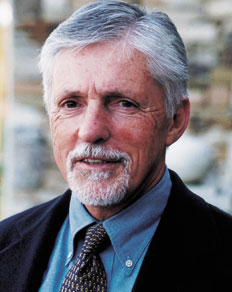

A publication of The Graduate School, University of North Carolina at Chapel Hill
Archives Spring 2000
Home | Back issues | About us | Email your feedback | The Graduate School | UNC-Chapel Hill | Make a gift
Partnerships for the Future
For David McNelis, graduate studies are a crucial part of North Carolina's future
Dr. David McNelis wears a variety of hats at Carolina as a graduate alum, a member of the Graduate Education Advancement Board (GEAB), an Adjunct Professor, and the Director of Research Programs for the Carolina Environmental Program. To Dr. McNelis such diverse involvement is all part of promoting Carolina's outstanding graduate programs. "I believe that we have a responsibility to help develop the next generation of professionals, researchers, and educators," he says. "Graduate education is the key to intellectual and disciplinal maturity. I’m proud of the fact that Carolina is ranked in the highest tiers in most fields."
Dr. McNelis is a firm believer in the importance of close links between the University and the community. Since 1997, he has been the Director of Research Programs and adjunct faculty member for the Carolina Environmental Program at UNC-Chapel Hill. The CEP, an overarching interdisciplinary organization, seeks to foster environmental studies at Carolina. Current CEP research projects include a study of the environmental factors that contribute to asthma in children, especially in rural areas of North Carolina, as well as a study of the ways pollutants are transported through North Carolina’s coastal environments.
 |
| Photo by Karen Tam |
In addition to Dr. McNelis' many involvements with the University, he is also the Chief Scientist in the Environmental Sciences and Engineering division of the Research Triangle Institute (RTI)--a role he says meshes well with his position at CEP. "RTI and CEP pretty much have complementary roles in the environmental research arena," he explains. "RTI tends to be more applied, and UNC tends to focus more on the fundamental science. For both, I try to develop and seek out research funding opportunities, identify and assemble a team of researchers to respond (including developing partnerships with other academic or private institutions), and see that we have a competitive proposal."
Dr. McNelis' knack for developing partnerships shows not only in his role as a scientist but also in his role as a supporter of graduate studies. His continual efforts to strengthen the bond between graduate education and the community bring attention to both the brilliant work of graduate students at Carolina and the importance of that work to the State.
Dr. McNelis considers his work as a volunteer on the Graduate Education Advancement Board to be a part of his responsibility to Carolina and the community, but he also finds it personally rewarding. "I have become familiar with the Royster Fellows as a result of my work with the GEAB," he says, "and their brightness and diversity of interests are amazing. It is very important that students of this caliber have access to the superb education that Carolina can provide. These students are the key not only to the University’s future but also to the State’s. Many of them will have the opportunity and desire to stay in North Carolina and contribute to it."
Dr. McNelis’ support of graduate education is multi-faceted: in addition to his board membership, he and his wife Gladys hosted a reception on behalf of the Royster Society of Fellows in April of last year and a second reception (facing page) at the Governor's Club in October. These receptions have helped to increase awareness regarding the vital role of private support for the quality of Carolina graduate education.
Because Carolina is a state-funded institution, North Carolina taxpayers are partners in providing basic funding for graduate education; however, for Carolina to become the best public university, it will require significant investment by private donors as well. Supporters like David McNelis are helping to ensure a high quality future for Carolina and the State.
- Amy Weldon
© 2002, The Graduate School, The University of
North Carolina at Chapel Hill
All text and images are property of The Graduate School
at the University of North Carolina-Chapel Hill. Contact Sandra Hoeflich
at shoeflic@email.unc.edu
to request permission for reproduction.
Contact Alexandra Obregon at aobregon@email.unc.edu if you have technical problems with this Web site.